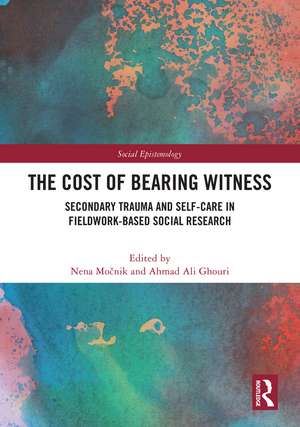The Cost of Bearing Witness: Secondary Trauma and Self-Care in Fieldwork-Based Social Research
Editat de Nena Močnik, Ahmad Ali Ghourien Limba Engleză Hardback – 4 apr 2024
The chapters in this book discuss various facets of secondary trauma from different methodological and theoretical perspectives, geographic, and historical contexts, and address a wide range of questions spanning from recent complex topics to semi-historical events and future concerns causing traumatic anxiety. While most chapters explore the process of healing and recovery from traumatic experiences during fieldwork-based research, few chapters also propose constructive approaches for developing personal and institutional methodologies and techniques to better prepare researchers to cope with secondary trauma.
The book offers useful insights and concrete changes in research methodologies that can help minimize the risk of trauma and new approaches to preventing and handling the consequences of conducting field-based social research in traumatic environments. It was originally published as a special issue of Social Epistemology.
Preț: 997.90 lei
Preț vechi: 1216.95 lei
-18% Nou
Puncte Express: 1497
Preț estimativ în valută:
190.95€ • 208.07$ • 160.90£
190.95€ • 208.07$ • 160.90£
Carte tipărită la comandă
Livrare economică 24 aprilie-08 mai
Preluare comenzi: 021 569.72.76
Specificații
ISBN-13: 9781032737126
ISBN-10: 1032737123
Pagini: 114
Dimensiuni: 174 x 246 x 8 mm
Greutate: 0.39 kg
Ediția:1
Editura: Taylor & Francis
Colecția Routledge
Locul publicării:Oxford, United Kingdom
ISBN-10: 1032737123
Pagini: 114
Dimensiuni: 174 x 246 x 8 mm
Greutate: 0.39 kg
Ediția:1
Editura: Taylor & Francis
Colecția Routledge
Locul publicării:Oxford, United Kingdom
Public țintă
Postgraduate, Undergraduate Advanced, and Undergraduate CoreCuprins
Introduction: Re-Thinking Exposure to Trauma and Self-Care in Fieldwork-Based Social Research 1. Why Fit in When You Were Born to Stand Out? The Role of Peer Support in Preventing and Mitigating Research-Related Stress among Doctoral Researchers 2. Dialogical Research Design: Practising Ethical, Useful and Safe(r) Research 3. Gendered Embodiment of the Ethnographer during Fieldwork in a Conflict Region of India 4. Going to Work ‘High’: Negotiating Boundaries while Doing Ethnography of Drugs 5. Bearing Witness to Suffering: A Reflection on the Personal Impact of Conducting Research with Children and Grandchildren of Victims of Apartheid-era Gross Human Rights Violations in South Africa 6. ‘I Was Close to Them’: Re-experiencing War through Trauma-based Interviews 7. The Cost of Bearing Witness to the Environmental Crisis: Vicarious Traumatization and Dealing with Secondary Traumatic Stress among Environmental Researchers
Notă biografică
Nena Močnik received her PhD at University of Ljubljana (Slovenia) and is currently Maria Skłodowska Curie EUTOPIA (Science and Innovation) Fellow at GRITIM - UPF Barcelona and CYU Paris. She is the author of two monographs, Trauma Transmission and Sexual Violence: Reconciliation and Peacebuilding in Post-Conflict Settings (2021), and Sexuality after War Rape: From Narrative to Embodied Research (2017). Her research interest covers collective traumas, identity-based violence and non-medical trauma rehabilitation.
Ahmad Ali Ghouri’s research is interdisciplinary and focussed on critical and comparative approaches to international law and transnational discourses on Islamic law. These two apparently divergent fields find metalevel convergence in his enquiries about the Islamic state practices in international law and accommodation and interpretation of Islamic law and practices by secular states. The broader issues addressed in his research come down to transnational identities and practices reflected in public and private governance having economic as well as broader societal implications.
Ahmad Ali Ghouri’s research is interdisciplinary and focussed on critical and comparative approaches to international law and transnational discourses on Islamic law. These two apparently divergent fields find metalevel convergence in his enquiries about the Islamic state practices in international law and accommodation and interpretation of Islamic law and practices by secular states. The broader issues addressed in his research come down to transnational identities and practices reflected in public and private governance having economic as well as broader societal implications.
Descriere
This highly interdisciplinary volume fills the gap in research ethics that has so far omitted to address the psychological, physiological, and socio-political impacts on researchers conducting field-based social research in traumatic environments.
